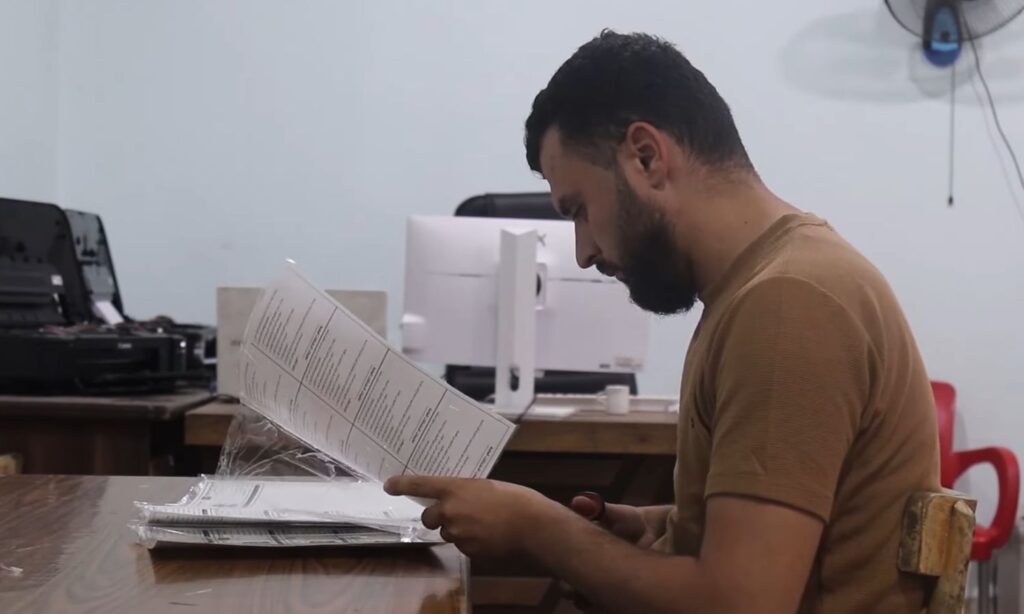Idlib – Anas al-Khouli
Tens of thousands of students from the basic and secondary education stages are preparing to start their exams in the city of Idlib, northwestern Syria.
The exams start on June 24 and continue until mid-July. During this period, families are preparing the right environment, and teachers and institutes are actively helping students.
On May 16, Mahmoud Habboub, Deputy Director of the Examination Department in Idlib, announced that the registration of all students for both the basic and secondary stages in all branches had been completed, mentioning that the number of registered students reached 56,000.
300 Examination centers
Ahmed al-Hassan, Director of Education in Idlib, said in a statement to Enab Baladi that the number of students registered for high school exams this year reached 15,550 students for the scientific branch, 8,007 for the literary branch, 260 for the Sharia branch, and 267 for the vocational branch.
He added that the number of examination centers reached 300 for ninth and secondary students, noting that the Directorate of Education worked on preparing the examination centers, providing them with water, seats, and logistics, and distributing monitors and delegates to the examination centers and preparing stationery.
Al-Hassan mentioned that the Directorate of Education held seminars for high school students in both the literary and scientific branches to raise awareness about the exams and answer students’ questions based on each subject.
On June 10, the Directorate of Education announced that exam cards were ready for students, mentioning that formally registered students receive their cards from their schools, while unregistered students receive them from the educational complex to which they belong.
Attempts to help
Maher al-Sayed (18 years old), a high school student in the literary branch, lives in a state of anticipation and psychological instability. He mentioned that students need to exert extra effort before exams and some lessons to fill in their gaps.
Al-Sayed told Enab Baladi that the high cost of private lessons forced him to choose only one subject, English, to study in a private institute, trying to rely on himself and attend some online lessons for the rest of the subjects.
Some university students who previously suffered from high study costs try to help high school and basic education students by dedicating part of their time to teaching students according to their capabilities and specialties.
Yasser Obeid, an engineering student, dedicates two hours daily to teaching his neighbors’ children, who are high school students, to help them achieve good results in their exams.
Obeid told Enab Baladi that his father could not afford the costs of private lessons during his high school time, which currently pushes him to help students.
He added that he could not dedicate more than two hours daily to teaching students mathematics due to his approaching university exams, pointing out that there are other university students helping in the same matter.
Deteriorating sector
Despite attempts to support education, the educational sector in northwestern Syria suffers from problems affecting staff and infrastructure. Public schools suffer from continuous crises, a lack of supplies, reduction in support, a shortage of diesel for heating, and a lack of textbooks and teachers’ salaries.
The United Nations Office for the Coordination of Humanitarian Affairs (OCHA) mentioned that the military escalation in northwestern Syria significantly affected access to educational services, according to its report in November 2023.
It added that 2.2 million school-age children reside in northwestern Syria, with at least one million out of school, noting that the situation is particularly dire in displacement camps.
57% of children do not have access to primary schools, and 80% do not have access to secondary schools.
The earthquake in February 2023 left its marks on the educational sector in areas controlled by the Syrian Salvation Government (SSG) in Idlib and western Aleppo. The earthquake resulted in 39 deaths among teachers and administrators, and 421 students, and 250 school buildings were damaged.

